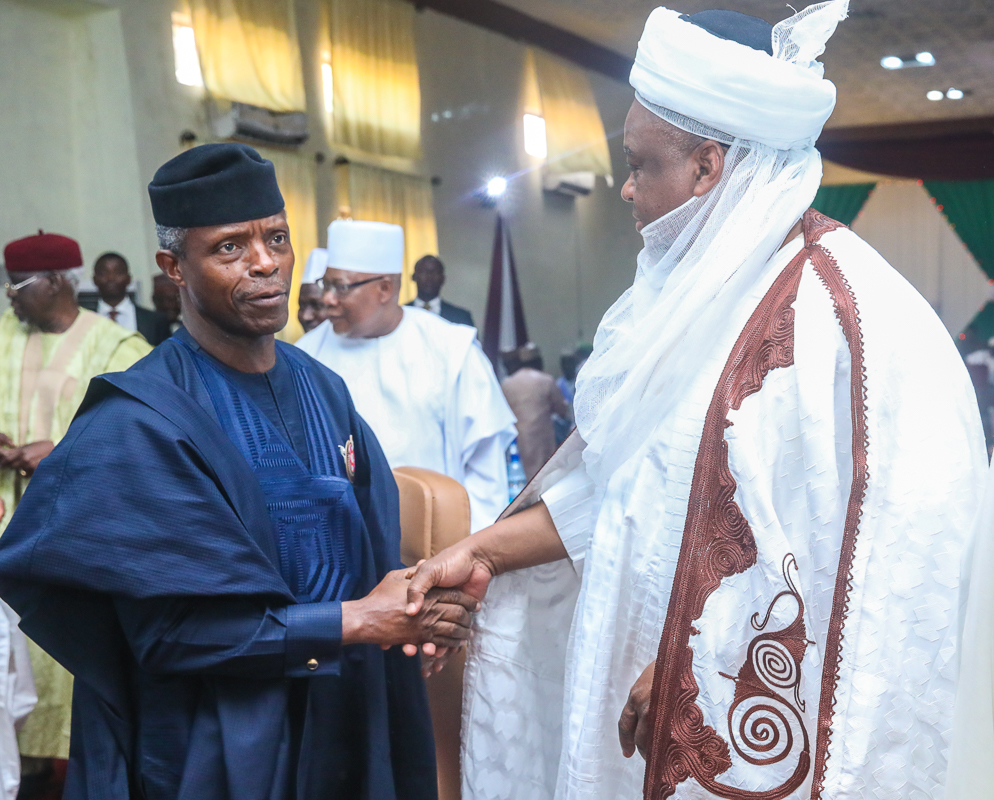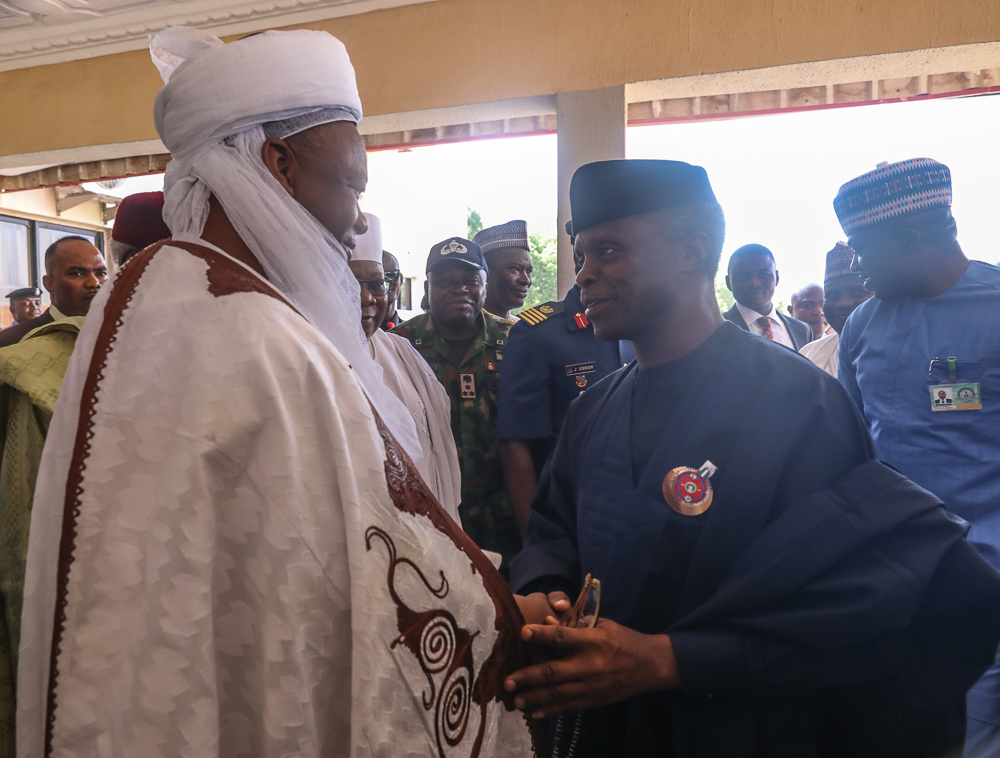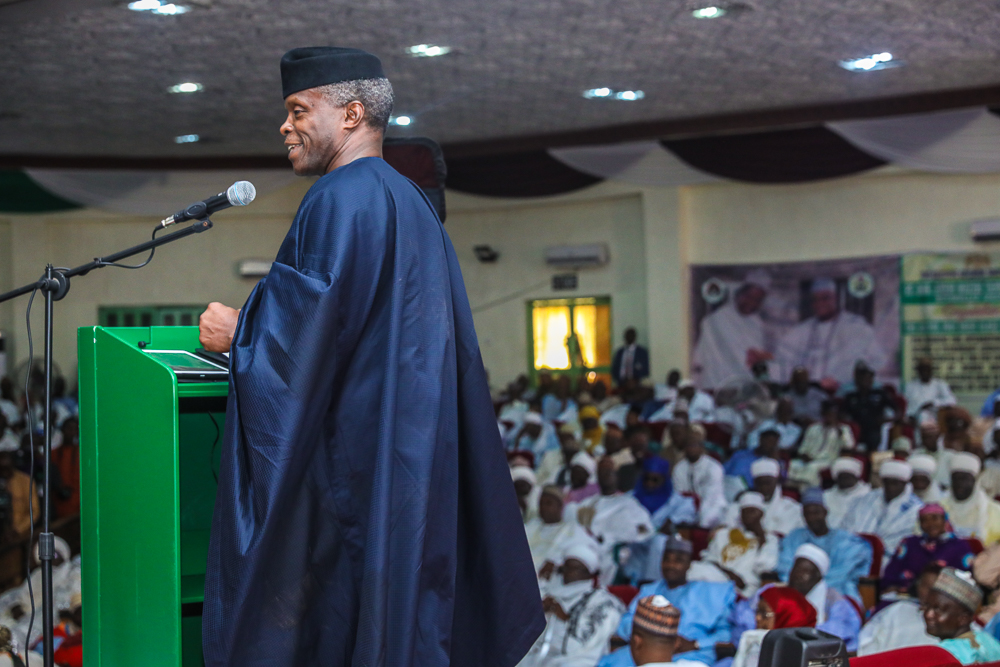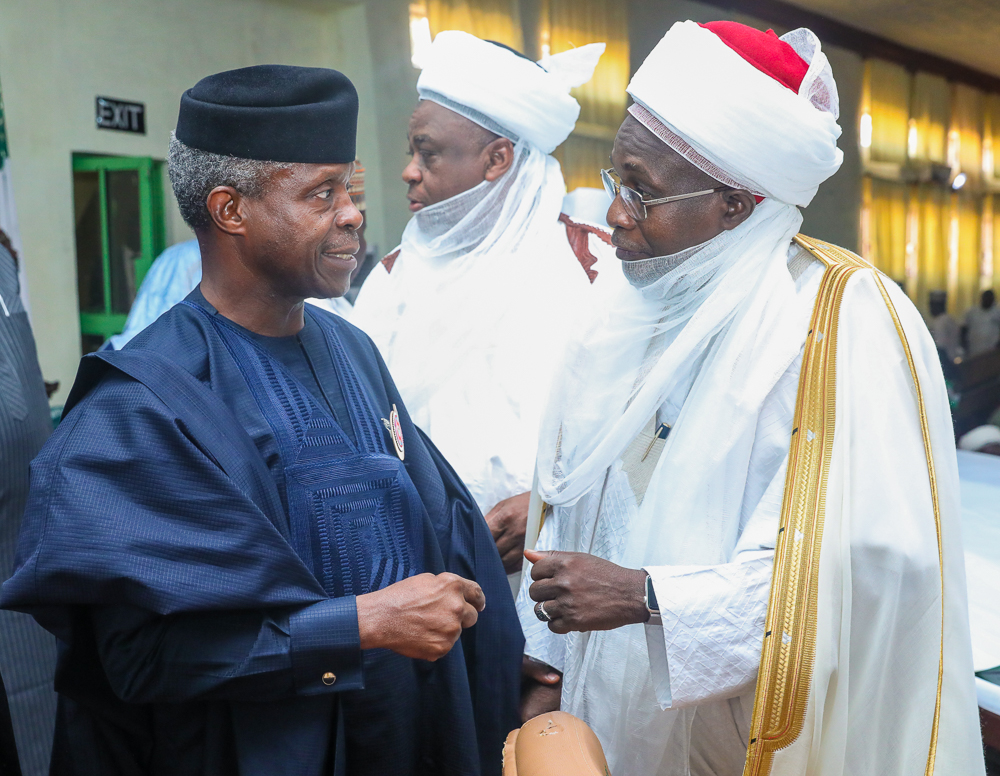Lecture Given At Barewa Old Boys Association Annual Lecture Series
THE CHANGES WE HAVE BROUGHT IS NOT DIFFICULT TO SEE, SAYS VP OSINBAJO
*Adds: Ongoing Police reforms, Social Investment Programmes, payment of pension arrears, proof of Buhari administration’s change mantra
Buhari administration has ensured financial autonomy for State Judiciaries, State Houses of Assemblies
SPEECH BY HIS EXCELLENCY, PROF. YEMI OSINBAJO, SAN, GCON, VICE PRESIDENT OF THE FEDERAL REPUBLIC OF NIGERIA, AT THE BAREWA OLD BOYS LECTURE IN SOKOTO, ON SATURDAY, 3RD NOVEMBER, 2018.
Protocols
The Barewa Old Boys Association deserves commendation for hosting these lectures on national development through the years. Indeed, going through the years, you will notice that from 1986, almost constantly, with a few breaks here and there, they have had these series of lectures on issues of national development. But more so, they deserve our commendation for the choice of subject of the lectures and that has been focused on how to hold our nation, our society and its leadership, to the promise of higher and nobler standards. Our leadership, our society, our nation, must be held to that promise of higher and nobler standards.
This great college, Barewa College, has nurtured some of the brightest, most courageous and most patriotic minds that our nation has ever seen; the great visionary, Sir Ahmadu Bello, the Sadauna of Sokoto, who was responsible for ensuring the organisation of Northern Nigeria into the federal system that our nation has become. His incredible foresight led a lot of the educational development that Northern Nigeria has experienced, especially in those early days in Nigeria.
Nigeria’s first Prime Minister, Alhaji Tafewa Balewa, the golden voice of Africa, whose vision of a united Nigeria, withstood the challenges of time and until today; his vibrant words of unity continue to echo amongst us. It is he who said and I quote, “we must recognize our diversity and the peculiar conditions under which the different parts of the community live, the federal system under the present condition, the only sure basis that Nigeria will remain united.”
Sir Kasheem Ibrahim, first indigenous Governor-General of Northern Nigeria and of course, Mallam Aminu Kano, perhaps Nigeria’s most articulate proponent of a pathway for social justice, especially in a desperately poor society and General Murtala Mohammed, who was killed as he courageously led an attempt at a Nigerian and African ethical and moral rebirth. And of course, today’s chair and former Head of State, who by the sheer hand of God, led the country when there was an existential need to declare to a divided country, that there was no victor, no vanquished, Alhaji Shehu Shagari, Nigeria’s first Executive President.
Frankly, I don’t know of any other Nigerian institution, whose products have so definitively defined the course and content of Nigeria’s history such as the Barewa College. That sort of pervasive influence has its positives and negatives.
The fact that the substance and tone of the lectures in these series have sought to focus the nation’s mind on the most potent challenges and its greatest opportunities for remedy or redemption, gave me very high expectations of the lecture on the Challenges of the Judiciary to a Democracy: The Nigerian Perspective, the lecture so brilliantly delivered by his Royal Highness, Alhaji Lawal Hassan Gummi, Retired Chief Judge of the High Court of the Federal Capital Territory.
His Lordship largely meets those expectations as he clearly makes the point about the importance of separation of powers, the centrality of the rule of law and the importance of respect for the adjudicatory conclusions of our courts, whether they are palatable or not palatable.
His Lordship expectedly gives a pass mark to the Judiciary, his own constituency. And I quote him where he says, “by and large, the Judiciary has remained faithful to the constitution and by extension democracy, by ensuring fair hearing and guarding against violations of democratic norm. Ultimately, the aim of the Judiciary is to maintain cohesion in the society by arbitrating between man and man, as well as, man and State. In Nigeria, I have no doubt that the Judiciary has gone a long way in achieving this, notwithstanding the enormous challenges it encountered.”
I believe that his Lordship is right that the Judiciary has served a most useful purpose. I am not entirely certain though, that his Lordship has been as fair to the Executive. Certainly, I do not believe that his Lordship’s entire conclusions on the Executive have been entirely fair. Perhaps, there is a need to correct some of the premises upon which his Royal Highness’ observations are based so that we do not end up diminishing the very crucial points that his Lordship made.
My Lord’s assertion that nothing has changed with regard to democratic conduct even in this administration is not in my respectful view, borne out by the facts. For with respect, the relationship with the Executive and National Assembly and I think it’s fair to say, that this current Executive has refrained from interfering with first, the National Assembly’s choice of its leadership and the conduct of its affairs, even though sometimes some may argue that it is detrimental and has considerably slowed down the work of the Executive, but it has afforded us a valuable learning process.
There has been no attempt under this government, to stampede the Legislature. It’s easy to forget that Nigeria had five Senate Presidents from 1999 to 2007, very easy to forget. Several Governors in the years gone by were forcibly impeached by the Legislature, acting on the presumed behest of the Federal Government.
Many of us remember Joshua Dariye, impeached by 5 legislatures at about 6 am in 2006. The five-man House of Assembly met under tight security and impeached the governor immediately after that, Michael Botmang was sworn in as Governor.
Peter Obi was impeached by Legislatures who moved into Awka at 5 am and began sitting shortly after that. The House of Assembly members arrived at about 5 am and made short order of impeaching the then governor of Anambra State. Same as Chris Ngige, who was abducted by police officers, I am sure many of us will remember.
At that time, it was said that the Governor had resigned, and the Chief Judge was promptly ordered to swear in his deputy, Okechukwu Ode, who immediately assumed the functions of the State Governor, although the police claimed that they were taking the Governor into protective custody. The embattled Governor reiterated that he was abducted, as hundreds of his supporters from the 21 local governments at the time, welcomed him back to the State House.
The truth of the matter is that there have been several different violations of that honoured relationship between with the Executive and the Judiciary. We also remember Rasheed Ladoja, who was impeached in 2006. The Supreme Court upturned his impeachment. Perhaps, my Lord may be excused for forgetting about the assault in 2014 on the National Assembly by the then Executive, but my brother, His Excellency, the Governor of Sokoto State will not forget as then he was the Rt. Hon. Speaker and many of his colleagues resorted to acrobatics to scale the walls of the National Assembly which was then blocked apparently by an executive order.
When my Lord excused that government from any form of misbehaviour, I was surprised. I was the Attorney General in Lagos when the Executive withheld the funds due to our Local Governments and due to our State. We were not able to recover it despite the Supreme Court’s order until after we had left office. In the same period, 2013 – 2014, I make these points because my Lord had mentioned that perhaps the governments of Umaru YarAdua as well as, Goodluck Jonathan should be excused, but that same period 2013 – 2014, if you recall, the Governors Forum came under severe executive interference. If you remember the whole controversy as to whether 16 is greater than 19, indeed 16 was held at the time, to be greater than 19.
You will agree with me that a lot of what we are seeing today, and if you recall also, the Executive at the time, besieged the Rivers State Government house. All of these took place in very recent history. You will agree with me that a lot has changed, at least with respect to that, we are no longer seeing this sort of things.
The government has also in more recent times, taken significant steps at police reforms, and we hope that these police reforms will come into fruition.
Under President Buhari, the National Assembly is in my view, perhaps at its most independence since 1999. These changes are being brought about through democratic processes and to some extent, despite the tensions that must always exist between the Executive and the Legislature, all of these changes are still done and still being made.
Unsuccessful attempts have been made in the past, to bring about a holistic financial autonomy of the Legislative and the Judiciary in Nigeria, it is, however, under this administration that we have ensured that the financial autonomy has been extended to State Judiciaries and State Houses of Assemblies.
My Lordship also appears to be a bit dissatisfied with the slogan that change begins with the individual; he says, and I do agree with him, that the change must begin with us, that is to say, the Executive. But it was the great Mahatma Gandhi who charged us all to be the change we want to see. It is a call to civic responsibility, it is not an excuse and I agree with him entirely, it is not an excuse for leadership not to own up to its own responsibilities.
But permit me to say that the change in our nation may not be as difficult to see as all that. Clearly, we have not seen all that we expect to see. But today, if we were to ask our brothers and sisters in the Northeast who watched Boko Haram seize 14 Local Governments as at 2014, hoist their flags in 14 different Local Governments, saw schools and major roads closed and could not even celebrate Sallah or Christmas for many years, then perhaps we will find that they will say they have seen some change.
If we were to ask the 720,000 farmers who today, are enjoying credit, support and agricultural inputs being made by the Anchor Borrowers’ programme and getting a more steady supply of fertilizer because of the Presidential Fertilizer Initiative, and getting it at significantly cheaper prices, perhaps they might say that they have seen some change.
If we were to ask about the 500,000 graduates who have been employed under the N-Power programme and this N-Power programme is direct government employment and they are trained using the tablet (such as the one I’m using), in various entrepreneurial skills to be useful to themselves after the period of employment, perhaps they might say that there is some change.
If we were to ask the pensioners; the Nigerian Airways staff, Delta Steel company staff, ex-police officers, ex-Biafra police, etc., who before now, received no pensions after several years of abandonment, perhaps they might say they have seen some change.
The petty traders who are getting micro-credits from the Federal Government, many of them (we are doing two million) who are getting direct credit; they were long ignored and no one paid them attention, the poorest in the value chain, the poorest of our people, no one ever paid attention to their welfare. Today, they are getting some stipend; they are opening bank accounts on account of the Federal Government, perhaps, they might say that they have seen some change.
Or better still, if we were to ask the 9.2million school children and their parents in 48,000 schools in 26 States nationwide, who are eating one meal a day, perhaps, they will say that certainly, they’ve seen some change. 297,000 indigents in 20 States now receiving monthly stipends under our Conditional Cash Transfer programme, all of those ones, each of them and the families that they represent; they wouldn’t argue that there is no change.
Ask the contractors who have returned to sites since 2016, because our budgets for roads have grown 20 fold since then. Ask the artisans and labourers, who have found jobs in the many roads, railroad and housing projects. There is no State, and the Minister of Power, Works and Housing, is here in Sokoto State today, no State in Nigeria is without a major Federal Government project today.
As things presently stand, it is of course, possible to say that the politicians have nothing to show for the lessons of the failure of the first and second Republics as my Lord has said. I must also say respectfully, that a lot of impunity that has come to define public office in Nigeria, in term of corruption, especially grand corruption, has been sanctioned under this administration, in this case of grand corruption because the society has a problem of corruption and a major problem concerning corruption affecting all institutions.
Grand corruption is that case of corruption where the Executive approves the taking of money directly from the treasury, the stealing of resources directly from the treasury experienced in the past few years. Today, that’s no longer the case. Today we do not have a situation where under a government, $292million is taken from the treasury in one day and it simply disappeared. All the money we are giving to 2million petty traders is N20billion; if you look at what that could do, a $100million is N36billion.
The case of a fraudulent oil contract where $3billion disappeared, and even as we speak, we are still struggling to get it back. All of the days of the disappearance of large sums of money, the days of huge sums of money have stopped. We have stopped grand corruption.
We have not got to the point where we are able to stop contractor corruption, it shows the extent of the problem, but God helping us, we will get to that point and our country will change. We will deal with these issues of corruption.
These days, the government is achieving far more with little. We are earning 60% less than the previous government and we’ve spent N2.7trillion on capital infrastructure, the largest capital spend in the history of our country, despite getting 60% less.
It is in the area of justice that we have perhaps, some of the more important challenges. When I say justice, I mean in our definition of justice. The truth is that the Nigerian elites see justice from the point of view of how we the elites are treated. If a member of our company, a member of our group, by group, I refer to political, religious and business elites, if justice begins to thrive, we suddenly begin to shout injustice, injustice! Justice for the majority of our people who are poor, who are dispossessed, has a different definition. This why as a lawyer, I was greatly inspired by the thoughts of Mallam Aminu Kano, because he understood what the concept of social justice meant.
The Indian court in defining what it is to have the right to life, says if a person doesn’t have right to social welfare, if a person does not have access to health care, to education, that right to life has been denied.
That is the view of Mallam Aminu Kanu; that our country must provide for the extremely poor; that the whole purpose of government is to ensure the welfare of all, which is justice and we must ensure that that form of justice becomes a norm in our nation.
Let me again thank and commend my Lord for his lecture, I will look at it again in greater detail, now that I have a full copy. I will still write to you my Lord and send to you.
I want to thank you very much for the time we have shared. God bless you.





